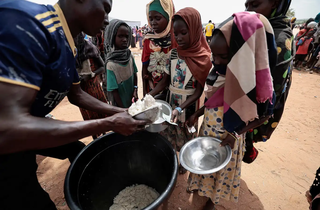The war between the Sudanese army and the Rapid Support Forces (RSF) has ripped through the nation's heart, leaving a trail of destruction and pushing millions towards the precipice of starvation.
A Nation Ravaged: Hunger's Grim Grip
The conflict has crippled agricultural production, the lifeblood of Sudan's food security. Major infrastructure lies in ruins, trade routes are severed, and essential supplies are scarce. This brutal reality is reflected in the staggering number of people facing acute food insecurity – a staggering 18 million, constituting over a third of the entire population.
The most vulnerable bear the brunt of this suffering. Darfur and Kordofan regions, along with Khartoum and Al Jazirah states, have become hotspots of hunger, with nearly 90% of the acutely food insecure residing there. Children are especially at risk, with malnutrition rates skyrocketing to alarming levels. A recent report from Médecins Sans Frontières (MSF) paints a horrifying picture: a child dying every two hours at the Zamzam camp in El Fasher, North Darfur. The UN estimates that in the coming months, a staggering 222,000 children could perish from malnutrition if immediate action is not taken.
The Looming Shadow of Famine
The future for Sudan appears bleak. The disruption to cereal production has been catastrophic, with a near 50% drop recorded last year. This shortfall, coupled with the country's dwindling financial and logistical capacity to import the required 3.38 million tonnes of cereals in 2024, paints a grim picture. Rising production costs threaten to further inflate already sky-high market prices, pushing essential food items even further out of reach for millions.
The specter of famine looms large. The UN has issued a stark warning, emphasizing that without a swift and coordinated international response, Sudan risks becoming the world's largest hunger crisis.
Obstacles to Delivering Hope: The Urgent Need for Unimpeded Aid
Despite the desperate need, delivering life-saving aid remains a challenge. Humanitarian organizations continue to face significant obstacles in reaching those most affected by the conflict. While a recent UN Security Council resolution called for full and unhindered access, progress on the ground has been sluggish.
There have been some positive developments, however. Sudan's decision to reopen the Tine border crossing with Chad for aid delivery offers a glimmer of hope. Additionally, allowing aid trucks to enter West Darfur through Chad and the preparation of a large-scale food assistance convoy are welcome steps. However, these measures fall far short of what's needed to avert a full-blown famine.
Cross-line deliveries within Sudan are crucial to reach those trapped in conflict zones. Humanitarian workers and supplies require robust protection to ensure the safe and effective distribution of aid.
A Regional Crisis with Global Repercussions
The crisis in Sudan transcends national borders. Millions in neighboring South Sudan and Chad are also grappling with severe food insecurity. The destabilization of Sudan, a nation already grappling with internal strife, could create a ripple effect throughout the region, jeopardizing fragile peace and security.
A Call to Action: Preventing the Unthinkable
The international community must act with urgency and resolve to prevent a catastrophic famine in Sudan. Unimpeded humanitarian access throughout the nation is paramount. Increased financial resources are needed to scale up aid operations and provide life-saving assistance to millions on the brink of starvation. All parties to the conflict must demonstrate a genuine commitment to allowing aid to reach those in desperate need.
The time for action is now. The future of Sudan, and the stability of the entire region, hangs in the balance. Only through a coordinated global effort can we prevent the unthinkable and offer a lifeline to a nation in peril. (ILKHA)



 Güncel
Güncel
 Güncel
Güncel
 Spor
Spor
 Güncel
Güncel
 Dünya
Dünya
 Güncel
Güncel
 Bilim & Teknoloji
Bilim & Teknoloji
 Dünya
Dünya
 Güncel
Güncel
 Güncel
Güncel





